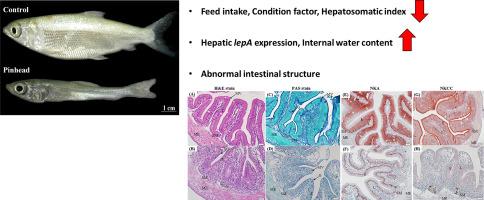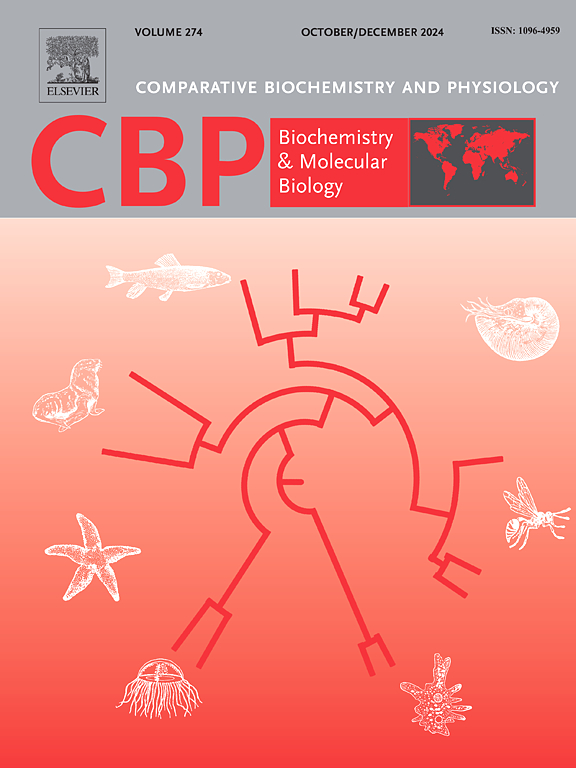Physiology, leptin gene expression, and intestinal morphology of pinhead and starved milkfish (Chanos chanos)
IF 1.9
3区 生物学
Q4 BIOCHEMISTRY & MOLECULAR BIOLOGY
Comparative Biochemistry and Physiology B-Biochemistry & Molecular Biology
Pub Date : 2024-11-16
DOI:10.1016/j.cbpb.2024.111048
引用次数: 0
Abstract
“Pinhead” is an abnormal condition of farmed fish which is rarely studied, albeit well known among fish culturists, and is characterized by extreme emaciation and anorexia. In this study, the potential impacts of pinhead condition in milkfish were analyzed and compared to fed, healthy, and a group starved for four weeks. The condition factor and hepatosomatic index of pinhead milkfish were significantly lower compared with fed, healthy individuals. Abnormal plasma osmolality and muscle water content in pinhead milkfish indicated an imbalance in their internal water content. The anorexigenic hormone, leptin A was highly expressed in liver of pinhead milkfish, which could be related to their lack of appetite. Meanwhile, the hepatosomatic index, intestinal somatic index, enterocyte height, number of villi and goblet cells, Na+/K+- ATPase activity, and intestinal protein content of the pinhead milkfish were similar to those of the 4-week starved individuals. Taken together, our results characterized key physiological parameters of pinhead milkfish for the first time. Further investigation is required to understand how environmental or artificial stress can lead to the occurrence of pinhead milkfish, and to develop methods for alleviating this condition.

大头牛奶鱼(Chanos chanos)和饥饿牛奶鱼(Chanos chanos)的生理机能、瘦素基因表达和肠道形态。
"针头 "是养殖鱼类的一种异常状况,虽然在鱼类养殖者中广为人知,但很少有人对其进行研究,其特征是极度消瘦和厌食。本研究分析了 "针头 "状态对牛奶鱼的潜在影响,并将其与喂养的健康牛奶鱼和饥饿四周的牛奶鱼进行了比较。与喂养的健康个体相比,针头乳鱼的体况系数和肝功能指数明显降低。针头乳鱼的血浆渗透压和肌肉含水量异常,表明其体内含水量失衡。厌食激素瘦素 A 在针头乳鱼的肝脏中高表达,这可能与其食欲不振有关。同时,针头乳鱼的肝体指数、肠道体指数、肠细胞高度、绒毛和小腺细胞数量、Na+/K+- ATP酶活性和肠道蛋白质含量与饥饿四周的个体相似。综上所述,我们的研究结果首次描述了大头牛奶鱼的关键生理参数。要了解环境或人工胁迫如何导致针头乳鱼的出现,并开发缓解这种状况的方法,还需要进一步的研究。
本文章由计算机程序翻译,如有差异,请以英文原文为准。
求助全文
约1分钟内获得全文
求助全文
来源期刊
CiteScore
4.60
自引率
4.50%
发文量
77
审稿时长
22 days
期刊介绍:
Comparative Biochemistry & Physiology (CBP) publishes papers in comparative, environmental and evolutionary physiology.
Part B: Biochemical and Molecular Biology (CBPB), focuses on biochemical physiology, primarily bioenergetics/energy metabolism, cell biology, cellular stress responses, enzymology, intermediary metabolism, macromolecular structure and function, gene regulation, evolutionary genetics. Most studies focus on biochemical or molecular analyses that have clear ramifications for physiological processes.

 求助内容:
求助内容: 应助结果提醒方式:
应助结果提醒方式:


